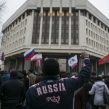
Implications of the Crimean Issue for the North Caucasus
Publication: Eurasia Daily Monitor Volume: 11 Issue: 47
By:

On March 5, the Federation Council, the upper chamber of the Russian parliament, called on the regions of the Russian Federation to support the residents of Crimea and the eastern Ukrainian regions adjacent to Russia. The parliamentarians called on the Russian regional officials to provide humanitarian, financial and other assistance to the people in these parts of Ukraine. The heads of Dagestan, Ingushetia and Stavropol region, among others, responded to the call with alacrity. Stavropol region governor Vladimir Vladimirov expressed his desire to take in members of the notorious Berkut special police unit, which was implicated in the violence against civilians during the standoffs in the streets of Kyiv. Dagestan’s Ramazan Abdulatipov announced his government was sending 15 trucks with humanitarian aid to Crimea. Ingushetia also announced it was collecting of aid for the residents of the Ukrainian peninsula (https://kommersant.ru/doc/2424274).
The authorities in North Ossetia said that 20 Ukrainian citizens had arrived in the republic and asked for temporary asylum. On March 3, state employees in the republic each transferred a day’s worth of their salaries to the Crimea assistance fund (https://north-osetia.kavkaz-uzel.ru/articles/239170/).
On March 3, Abdulatipov stated: “Dagestanis support the initiatives of the president of the Russian Federation, Vladimir Vladimirovich Putin, to support our compatriots in Ukraine. We do not forget that over 30,000 of our fellow Dagestanis live on Ukrainian soil and we are prepared to help them” (https://www.riadagestan.ru/news/president/zayavlenie_glavy_respubliki_dagestan_po_povodu_sobytiy_proiskhodyashchikh_v_ukraine/).
While the North Caucasian leaders unanimously support President Putin’s gamble in Ukraine, the question is how Russia’s potential decision to annex the Crimean peninsula will affect the North Caucasus itself. On March 6, the parliament of the Autonomous Republic of Crimea voted to join the Russian Federation as one of its regions, and to hold a referendum on the status of the peninsula on March 16 (https://www.kianews.com.ua/news/na-referendume-v-krymu-rassmotryat-vopros-o-vhozhdenii-v-sostav-rossii).
On March 4, President Putin stated that “Russia does not contemplate the possibility of annexing Crimea.” Putin then added a key clause: “Only the citizens themselves, under the conditions of free expression of will and security, can and should define their future. No one thus far has abolished the right of nations to self-determination” (https://itar-tass.com/politika/1020046). The State Duma, the lower chamber of Russia’s parliament, is considering an amendment to existing legislation that would allow Moscow to absorb foreign territories without the agreement of their host states (https://ria.ru/world/20140306/998431463.html).
By proclaiming the right of ethnic Russians in Crimea to secede from Ukraine and join their ethnic brethren in Russia, Moscow is providing ethnically non-Russian regions with a justification for seceding from the Russian Federation itself. “National republics might raise the issue of independence only if Russia is very significantly weakened—that is, if the situation returns to what was in 1990s,” Russian expert Maksim Bratersky told the Gazeta.ru website. “Just as Crimea is raising the question of joining the Russian Federation at a time when the Ukrainian state is weak” (https://www.gazeta.ru/politics/2014/03/06_a_5938745.shtml).
In autocracies, a change of government always involves a high risk of instability, so when Vladimir Putin leaves his leadership position in one way or another, Russia may be in flux once again, and its own borders may be changed.
Even if Russia does not formally annex Crimea, but keeps it in suspense as a quasi-independent state, the new situation will still have immediate implications for the North Caucasus. Crimea has a population of about 2.5 million, which is comparable to the population of the largest North Caucasian republic, Dagestan. The money that will go to support Crimea will have to be taken from other territories, including the North Caucasian republics that subsist on budget money sent from Moscow. The pro-Russian government of Crimea has already voiced the need for $1 billion of immediate help and $5 billion in investment. Apart from that, the Russian government would have to invest in infrastructure to create direct routes from Russian territory to the peninsula (https://kommersant.ru/doc/2422312).
Also, given the widespread corruption in Russia, the $6 billion that the Crimean authorities currently expect will grow at least two-fold in order to meet the needs of the residents of the peninsula. Some estimates put the costs of Crimea’s absorption into Russia at tens of billions of dollars (https://echo.msk.ru/blog/pochinok/1276866-echo/). This means that the North Caucasus will receive less from the budget pie, which will create local discontent.
If Ukraine succeeds in removing itself from the tight embrace of the brotherly Russian nation, this will create a new situation in Russia—one particularly similar to that of 1991, when Ukraine refused to sign the union agreement and Russia decided to leave the union as well, signifying the end of the Soviet Union. If Ukraine renders irrelevant the actual and theoretical Russian dreams of creating another iteration of the Russian Empire, Russians will be increasingly reluctant to stick to the North Caucasus, which is seen as culturally different from the ethnic Russian core.
Russian actions aimed at stripping Ukraine of territory and based largely on ethnicity justify the same approach being applied to the Russian Federation itself. Hardly anyone expects foreign actors to start recognizing the non-Russian republics of Russia as independent states now. However, there will be little sympathy for Russia when and if its central government weakens and its peripheral regions, in particular the North Caucasus, start seeking secession.




